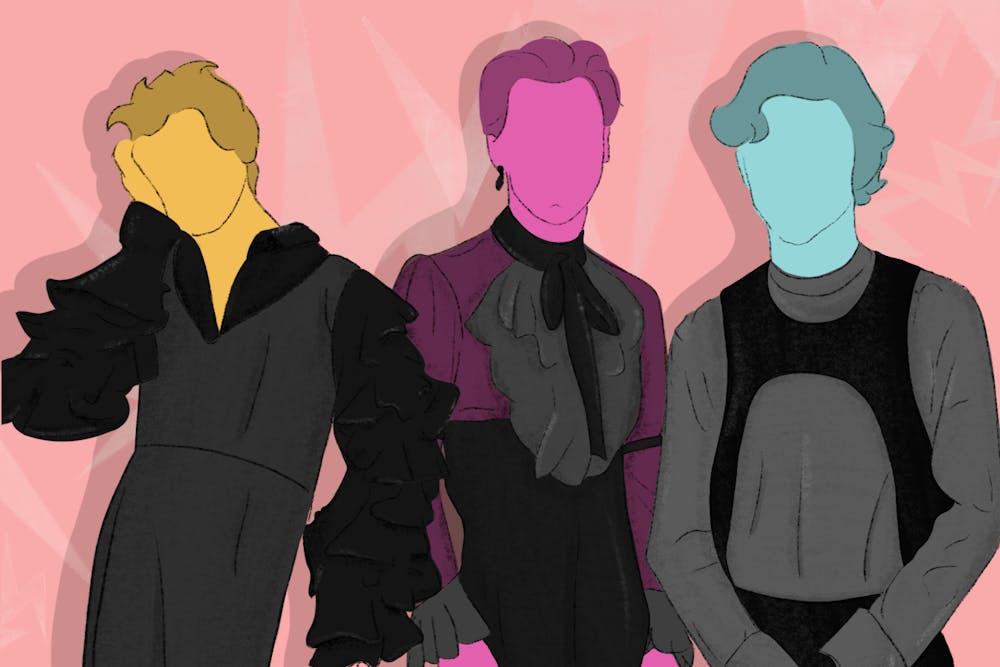In recent generations, an enlightenment has been gaining traction to combat the harsh enforcement of stereotypes and the grooming mechanisms of society that restrict personal expression. It’s a multi-faceted movement that has revealed itself in so many ways.
We have seen its message illustrated in the form of LBGTQIA+ movements, the conversation regarding an individual’s power to determine their own sexual orientation, feminist movements and social reform via fashion trends, music and art. Of the most recent facets is the “femboy” movement, largely popularized by TikTok, in which young men film themselves wearing what would traditionally be considered "girls' clothes," colorful make-up and a smile on their faces.
The term femboy emerged by the late 1990s to degrade men who didn’t adhere to the traditional standards of masculinity. In recent years, however, internet culture has positively transformed this identity by actively praising femininity and individualism.
Today’s generation is tired of being told what they can and can’t do and who they can and can’t be. The generations before us have created and enforced a society founded upon a power struggle, requiring some individuals to be submissive so others can be dominant, and men were deemed the dominant gender.
We have essentially defined ourselves in terms of power; thus, anything perceived as being synonymous with femininity, such as beauty and sensitivity, are considered inferior and weak, while traditionally masculine traits, such as physical strength and self-reliance, are considered superior.
The term “toxic masculinity” refers to the customary gender roles, which are associated with harm to male development, as it overemphasizes the importance of self-reliance, strength and dominance and underestimates the value of sensitivity, vulnerability and innocent sensuality.
Celebrities have been a driving force in the efforts to celebrate femininity. From Young Thug’s “No, My Name is Jeffrey” album cover art in which the famous rap artist wears a ruffled, periwinkle dress, to Harry Styles’ brightly-colored, floral suits, male celebrities have been incorporating traditionally feminine elements into their personal styles. They are praised by their fans because it is refreshing to see successful men who aren’t afraid to show a softer, more sensitive side of themselves. It’s empowering and sends a message to younger generations to simply be yourself and express that in any means you wish, with confidence and pride.
Today, the hashtag “femboyfriday” is now extremely popular on TikTok, a platform on which young, male content creators are supported for expressing their femininity.
Seth, also known as @thatsusboi on Tiktok, is a 17-year old content creator who received over a million views overnight after posting a video of himself wearing a tennis skirt and colorful nail polish. In a recent interview on the matter, he told VICE, “I wasn’t aware that there were tons of other boys like me, so the term [femboy] gave me a community.”
“I know my sexuality - I’m straight - but I still want to wear skirts and crop-tops, go to nail salons and feel pretty,” another creator, Moy, or @moysilk, told VICE.
We live and have lived in a society created by men, for men, which has resulted in a modern culture still littered with misogyny, intolerance and oppression, enforced primarily through the influence of gender norms. It is the privilege and responsibility of the younger generations to revise the current mold where it has failed us, and the toxic nature of gender norms is definitely a good place to start.
These preconceived customs influence so many aspects of human life, from fashion to personal hobbies, and have been strictly maintained and controlled by public shame when someone dares to overstep their boundaries. Boys play sports. Girls wear skirts. Boys don’t wear makeup. Girls are too emotional to be involved in politics.
As evolving, intelligent beings, we are given the freedom to be an ever-changing species, and conformity is a direct threat to such privilege. For so long, femininity has been synonymous with inferiority and weakness. Women continue to fight for their rights and freedoms tirelessly, and it’s movements such as these, which present traditionally feminine qualities in a strong, confident and powerful manner, while staying true to their soft and sensitive nature. It’s movements such as these that we should be paying attention to and supporting, because this is where change begins.

